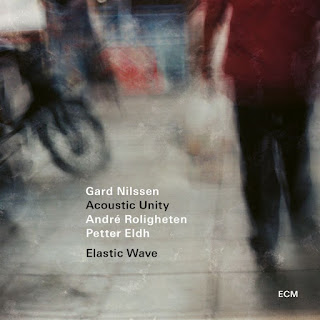According to Peter Brötzmann, Manfred Eicher’s ECM label "cuts the balls off powerful groups," with the result that they all sound the same, which he finds awful*. Now, if you only consider Gard Nilssen’s first two albums with his Acoustic Unity** (which is Nilssen on drums, André Roligheten on saxophones and clarinet and Petter Eldh on bass), - especially the outstanding triple album Live in Europe released on Clean Feed in 2017 - you’d be inclined to agree with the German fire-breather. But of course, it’s not that simple. Already To Whom Who Buys a Record (Odin Records, 2019), the band’s third album, didn't sound as wild and free as Live in Europe, instead one could sense a strong hardbop influence. In addition, there were also ballads like "Broken Beauty," which pointed to where the journey with the Acoustic Unity could go. Moreover, Nilssen has recorded for ECM before, for example on Mathias Eick’s Skala (2011) and on two albums by the Maciej Obara Quartet (Unloved, 2017 and Three Crowns, 2019). So, the step to present their new album Elastic Wave on the Munich label was somehow logical.
Even though the Acoustic Unity doesn’t sound as brute as it did in their beginning, dynamic interactions, a sense of swinging pulse, and bold, sharply delineated themes are still among the trio’s defining characteristics. Another one is their stylistic flexibility, which has its roots in shared experiences; the three have known each other since 2005.
Many influences come together in the trio’s music. In Roligheten’s saxophone playing you can hear Ornette Coleman, and when he plays the clarinet, Jimmy Giuffre’s style shines through. In general, the Giuffre Trio has clearly influenced the sound and harmonies of this album (e.g. in “Dreignau“). On “The Other Village“, he plays tenor and soprano saxophone simultaneously, which sounds as if Roland Rahsaan Kirk was playing Mediterranean bagpipes. On the whole, the trio offers a comprehensive overview of modern jazz history. This can be heard in the opener “Altaret“, a piece by Petter Eldh that comes across as freely contrapuntal, indicating to the trio’s concept of openness and freedom in improvisation and composition.
Gard Nilssen has named Tony Williams, Elvin Jones, Ed Blackwell, Roy Haynes and Jack DeJohnette as influences that have shaped his drumming style. But Jon Christensen’s well-known "Waves of Sound" approach has obviously also been an inspiration. To pay tribute to ECM’s drumming tradition, he brought one of Christensen's cymbals to the "Elastic Wave" session and integrated it as a second ride cymbal into the overall sound of his drum set. The title of the track "Lokket til Jon, og skjerfet til Paul" (Norwegian for: The lure for Jon, and the scarf for Paul) alludes to Christensen on the one and and on the other hand to a scarf that Paul Motian had once left behind in a studio, and which is used here to soften the bass drum’s resonating harmonics.
Finally, even those who appreciate the old Acoustic Unity will also find what they are looking for here: with its hard, lively drive "Acoustic Dance Music" is a piece reminiscent of the Ornette Coleman Trio’s recordings at the Circle in Stockholm.
All in all, Elastic Wave is simply a very diverse and coherent album in itself, which rather focuses on airiness and sound range. To say that the music would have no balls seems definitely too harsh.
Elastic Wave is available as a CD and as a download. You can find it on the usual streaming devices and you can listen to a short snippet here:
* Christoph J. Bauer: Brötzmann Gespräche (Posth Verlag, p. 75)
** The two album’s on Clean Feed are named Gard Nilssen’s Acoustic Unity, while the last two album are filed under Gard Nilssen Acoustic Unity

No comments:
Post a Comment
Please note that comments on posts do not appear immediately - unfortunately we must filter for spam and other idiocy.